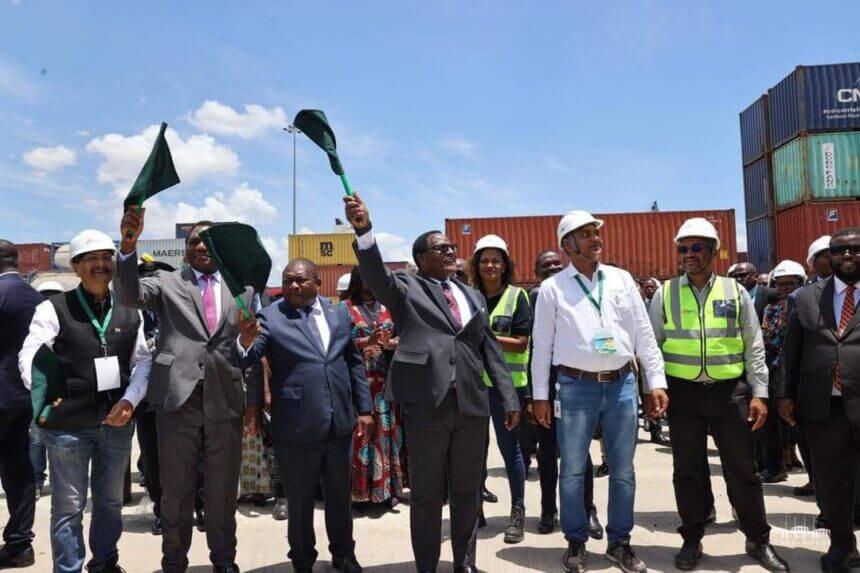
Our Projects are
Transforming African Trade
Quick Contacts
2nd Floor, Fidelity Insurance Centre Waiyaki Way, Westlands

It is not every day that good news in one country brings joy to residents of another country.
James Phiri, a merchant who imports and sells merchandise in Malawi’s Capital Lilongwe, smiles as he reads a news update that has just popped up on his mobile phone.
It is about the upgrading, expanding and modernising of the Nacala Port facility in neighbouring Mozambique.
“This is fantastic,” he says as he shows the update to his wife.
For a long time, the long distance to the port has given Phiri a headache when importing mechandise due to the high transport costs which have to be factored into the final price, thereby making the goods expensive.
Nacala is just 932km from Lilongwe and 700km from Liwonde, which is currently connected by rail to the Indian Ocean port.
“This will definitely help to bring down the cost of transport, thereby making the goods more affordable,” he says.
About 100km from Lilongwe in Zambia’s border town of Chipata, Jarson Mwendwa is equally excited by the refurbishment of the Nacala Port.

To Mwendwa, an improved Nacala provides shortest access to the sea.
On October 7 this year, Mozambique President Filipe Nyusi, Malawi President Lazarus Chakwera and Zambia President Hakainde Hichilema opened the upgraded, expanded and modernised Nacala Port facility that seeks to improve regional trade and integration.
The Nacala Port is Malawi’s shortest and cheapest route and will serve as a means of transporting commodities like fertiliser, fuel, pharmaceuticals, grain and consumer goods.
During the inauguration, the three leaders also signed the revised Nacala Development Corridor Agreement.
The agreement is one of the products of the Southern Africa Trade Connectivity Project, a World Bankfunded project under the Ministry of Transport and Public Works in Malawi.
It is hoped that an improved Nacala Port facility and the full operationalisation of the entire Nacala Development Corridor stands to improve Malawi’s trade competitiveness and economic growth.
The expansion and modernisation of the port also provides answers to the problems of congestion, turn-around time, and cost that used to be associated with Malawi’s use of the Nacala Port in the past.
The modernisation of the port will translate into transport and logistical efficiency and consequently reduced transaction costs on the Nacala route.
Nyusi said following the rehabilitation of the port, the facility has greatly improved on time taken to handle cargo.
According to Nyusi, the facility now handles 25 containers per hour as opposed to six containers per hour before the rehabilitation.
Transport Minister Jacob Hara said, currently, Malawi only imports and exports only eight percent of its merchandise through Nacala.
He said this has been the case because, initially, the Nacala Port did not have the required capacity to handle Malawi’s cargo.
“Now the port is able to handle ships of the Panama level to off load cargo here at a very terrific speed. We have seen the facilities here.
“They can handle up to 25 containers in one hour, offloading up to 1.2 million litres. That is speed. And then they have also connected this port to rail,” Hara said.
Chakwera challenged the private sector to take full advantage of the opportunities that have come about due to the rehabilitation of the Nacala Port.

According to Chakwera, the rehabilitated Nacala Port is expected to cut by a third Malawi’s transport costs, thereby making imports cheaper and exports more competitive.
“When all is said and done, we expect a boost in inclusive growth for various industries in our countries, especially in the energy, agriculture and manufacturing sectors. We also expect more employment and increased consumer demand, thus further strengthening our economies.
“I, therefore, call upon the private sector to take full advantage of the opportunities availed by the Nacala Development Corridor which is now a modernised port and well-equipped,” Chakwera said.
The Malawi leader said, as the three countries celebrate and jubilate on the inauguration of the expanded-modern Port of Nacala, there is a need not to lose sight of mega projects that they are implementing in addressing production inadequacies in the countries.
“Indeed, as we strengthen our cooperation on trade and transport, we also have to maintain cooperation on energy supply and distribution in order to enhance production of manufactured goods and productivity along our cherished Nacala Development Corridor,” Chakwera said.
During the inauguration, the three leaders saw off a train carrying fuel to Malawi.
Zambia President Hichilema said the Nacala Development Corridor is crucial for the growth of Zambia’s trade.
He urged Malawi to move with speed in rehabilitating it’s railway connection between Chipata and Liwonde so that the Zambia’s can reap maximum benefits from the improved Nacala Port.
Alongside the signing of the revised Nacala Development Corridor Agreement (NDC-Agreement), two other agreements were signed on Rail and Road Transport modes.
It is expected that through the execution of these agreements, there will be a vibrant Nacala Corridor that is attractive to both local and international investors.

The agreements will also be used to ensure continued improvement of transport and trade facilitation through the removal of physical and non-physical barriers to trade and transport.
The Southern Africa Trade and Connectivity (Satc) Project is a 6-year, $150 million World Bank funded project designed to increase private sector activity along targeted corridors of Malawi and Mozambique, through reduced trade costs and time, increased value chain development, and improved access to infrastructure.
The objective of Component 1 of the Satc project is to reduce trade costs and logistics bottlenecks and improve regulatory environment.
Chakwera hailed Mozambique for making available space in for establishing a dry Port in Nacala.
He observed that this would go a long way in minimising logistical challenges on freight destined for Malawi.
Read original article
Disclaimer: The views and opinions expressed in this article are those of the authors and do not necessarily reflect the official policy or position of TradeMark Africa.